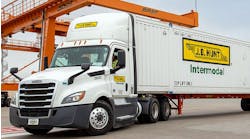MANAGER: Peter Kane and Greg Graves
TITLE: Vice president-operations and sales manager, respectively
FLEET: Kane Transport, Sauk Centra, MN
OPERATION: Fuel hauler with 180 tractors and 250 tanker trailers
PROBLEM:
Cold weather is always unpredictable, punishing man and machine equally alike; but for trucking, it's even more so. Just turning over diesel engines in freezing temperatures can be a challenge — and that's before the use of nouveau fuels such as biodiesel get thrown into the mix.
Biodiesel blends of B20 or below, a mixture of 20% biodiesel with 80% “regular” diesel, are considered by many to be ideal green fuels as they can be readily used in current diesel-powered equipment with few if any component changes.
However, one big difference between biodiesel and regular diesel is its cold flow properties. For example, B20's cloud point, the temperature at which it begins to gel or become waxy, is three or four degrees higher than straight diesel.
And truckers using biodiesel in their engines aren't the only ones who have to worry about its cold flow properties, either, notes Peter Kane, vice president-operations, for fuel hauler Kane Transport Inc.
“When your territory includes Minnesota, Iowa, Illinois, Indiana, Missouri, Nebraska, North Dakota, South Dakota, and Wisconsin, as well as Manitoba and Saskatchewan, you have to be ready for cold weather if you want to haul biodiesel year round, as biodiesel tends to gel or ‘freeze’ at higher temperatures than conventional diesel,” he says.
SOLUTION:
When customers approached Kane Transport to haul biodiesel, the carrier decided it needed to work on a way to make it happen. While such “freezing” wouldn't affect the fuel inside the insulated tankers Kane uses, it would be an issue for the exterior pipes that run along the bellies of its tankers. The company tapped Greg Graves, sales manager responsible for transportation of renewable fuels, gas, diesel, and compressed gases, to work with trailer maker Polar Tank Trailer to figure out a way to solve this cold flow problem.
In extreme cold weather, biodiesel would gel in the exposed piping on the belly of the trailers, hardening like a “stick of butter,” in Peter Kane's words, and creating a maintenance nightmare for the fleet. “There's no easy way to deal with frozen fuel in the pipes, except to wait for it to thaw,” he says. “Whatever we did had to be simple and effective. We're sensitive about adding weight, cost, or complexity, and Polar understood that.”
Together, Kane and Polar came up with a novel way to insulate and warm the bottom pipes on the fleet's 8,500-gal. 43-ft. aluminum tankers: wrapping the exposed belly pipes with, for lack of a better term, “electric blankets.”
Graves explains that the belly pipes are kept warm by a heated, insulated wrap to ensure an even temperature throughout. “It's a low-maintenance solution that should last the life of the trailer, which for us is 30 years,” he says.
Peter Weis, Polar's chief engineer, says the electrical heating system is also redundantly sealed against moisture and vapors. “This is a low-temperature system that operates essentially at ambient temperatures,” he explains. “The heating element is protected by a double vapor barrier and incorporates an internal thermostat to maintain correct temperatures while preventing overheating.”
All of the system's switches and indicators are vapor proof and mounted away from the fuel discharge area to prevent any sort of electrical spark from potentially igniting the fuel.
To date, Kane has bought 17 tanker trailers equipped with this custom-designed pipe-heating system, and five more are on order. “We've had no issues whatsoever with the product gelling or freezing, and we've now been hauling biodiesel in 30 or 40 below-zero temperatures,” Graves says.


